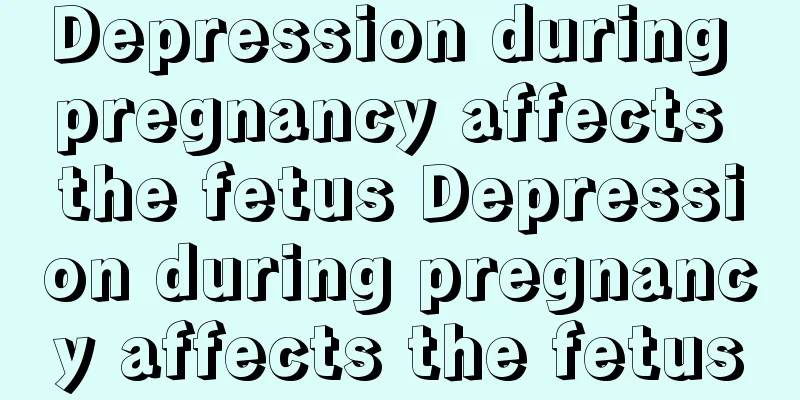How should I take care of myself during pregnancy? How should I take care of myself during pregnancy according to my physical condition?

|
Once a woman is pregnant, she needs to take in more nutrients for the growth of the fetus. So, how should she take care of herself when she is pregnant? How to regulate pregnancyMany pregnant mothers pay great attention to diet and lifestyle during pregnancy. In fact, pre-pregnancy conditioning is equally important for eugenics and good parenting. Moreover, the body should be adjusted according to different physical conditions. Qi deficiency constitution: replenish qi, strengthen spleen, and benefit lungs. People with qi deficiency constitution are often thin or overweight, speak weakly, are easily tired and forgetful, often sweat when sitting, and sweat more with a little activity, have poor appetite, and often have diarrhea. People of this type should pay attention to a balanced and diverse diet. They can eat more millet, carrots, mushrooms, tofu, chicken, yam, etc. They should avoid cold drinks, raw and cold fruits and vegetables, fatty meat, and fried foods. They should ensure adequate sleep, take a 1-hour nap every day if conditions permit, take a 40-60 minute walk outdoors, avoid strenuous exercise, and add clothes in time. Blood deficiency constitution: nourishing Yin blood. People with blood deficiency constitution usually have pale complexion, often feel dizzy, have light lips and nails, have scanty menstruation or amenorrhea, cannot tolerate physical labor, and are prone to insomnia. Such people should eat more easily digestible food, such as black fungus, spinach, carrots, pork, wolfberry, red dates, etc., and avoid spicy and fishy food. In addition, Chinese medicine believes that the spleen and stomach are the source of Qi and blood production, and too much sweet food will hinder the production of Qi and blood, so such people should not eat too much sweets. Moreover, people with insufficient Yin and blood are prone to depression and anxiety, so they should keep a happy mood and learn to self-regulate their emotions. Yin deficiency constitution: nourishing Yin, clearing away heat, and moistening dryness. People with this constitution show low fever in the afternoon, dry mouth and throat, sweating in the middle of the night when sleeping, stop sweating after waking up, irritability, and restless sleep. Diet conditioning should eat light food, and you can eat more sesame, honey, dairy products, fish, black fungus, wolfberry, white fungus, etc. Quit smoking and limit alcohol, especially strong liquor. Because Yin deficiency is often accompanied by internal heat, this type of people should avoid all spicy, hot, yang-enhancing and irritating foods, such as garlic, chili, pepper, prickly ash, and dried ginger, and also avoid hot tonics, such as ginseng. In addition, Yin deficiency can be further developed from blood deficiency. Therefore, in addition to the matters that people with blood deficiency constitution should pay attention to, this type of people should also control their sex life, learn to self-regulate emotions, and avoid rage. Yang deficiency constitution: warming and nourishing the spleen and kidney, boosting yang and dispelling cold. This type of people are usually fat, afraid of cold and prefer warmth, cold hands and feet, cold waist and knee pain, and tolerate spring and summer but not autumn and winter. In terms of diet, it is advisable to eat light and easily digestible food, and eat more mutton, chicken, onion, ginger, etc. Quit smoking and limit alcohol, avoid heat-clearing food, and do not eat too many raw and cold fruits and cold foods, such as bananas, tomatoes, bitter melons, amaranth, etc. What are the symptoms of early pregnancyExperts say that the most obvious symptom of early pregnancy is the cessation of menstruation. In addition, pregnant women may also experience breast enlargement, frequent urination, slight vaginal bleeding, and some pregnant women may also experience nausea, headache, dizziness, and emotional instability. If you find the above symptoms, you should take an early pregnancy test in time, because you are likely to be pregnant. 1. Stopping of menstruation If a couple has sexual intercourse around the ovulation period without taking any contraceptive measures, and their menstrual cycles are normal, but they suddenly experience amenorrhea symptoms for more than 5 days, they may be pregnant. The editor has compiled the real experiences of 1,200 pregnant mothers to teach you how to distinguish physical symptoms in early pregnancy with an accuracy rate of up to 90%! There are also authoritative expert videos to easily deal with discomfort after pregnancy! 2. Nausea and vomiting Many pregnant women will experience morning sickness starting from the fifth week of pregnancy. Especially nausea will occur in the morning and evening, and vomiting will occur without any reason. The cause of morning sickness is not clear at present, but data shows that it may be related to human chorionic gonadotropin (HCG) in the human body. When you first become pregnant, the level of human chorionic gonadotropin (HCG) in the human body begins to increase. The higher the level of this hormone, the easier it is to feel nauseous. 3. Breast enlargement and tenderness In the first week or two after conception, your breasts will become larger and softer. Because of pregnancy stimulation, your body will produce more estrogen and progesterone, which will cause the glands in the breasts to grow, so the breasts will become larger. These hormones also make the breasts able to retain more fluid, so the breasts will become sore and tender. 4. Increased leucorrhea After pregnancy, the estrogen in the body gradually increases as the pregnancy months increase. Estrogen can promote the secretion of mucus by the cervix and endometrial glands. The blood flow to the genitals, vagina, and cervix of pregnant women is vigorous, and the tissue water increases, so the secretions also increase, and the amount of leucorrhea also increases accordingly. What are the symptoms of mid-pregnancyIn general, expectant mothers feel more comfortable in the second trimester, but pregnancy reactions do not end there. Expectant mothers will still feel some discomfort, such as varicose veins, increased vaginal discharge, enlarged and painful breasts, hemorrhoids, stretch marks, edema and cramps, etc. So, what should expectant mothers do to reduce the pain caused by these uncomfortable symptoms? 1. Early prevention of hemorrhoids In the second trimester, the uterus becomes larger and presses on the intestines, making defecation more difficult. Continuous constipation can easily cause hemorrhoids. So in order to avoid hemorrhoids, constipation should be prevented first. It is recommended that expectant mothers drink more water and eat more fiber foods, such as corn, sweet potatoes, and soybeans. 2. Prevention of stretch marks requires careful care Before pregnancy, you should pay attention to exercise and massage regularly. At the same time, you should also pay attention to nutrition and eat more foods rich in protein and gelatin to increase skin elasticity. If stretch marks have already appeared, you don’t have to worry too much. Adjust your eating habits, ensure a balanced and nutritious diet, eat more fresh fruits, and consider applying stretch mark cream. 3. Prevent cramps and take calcium supplements at the right time Expectant mothers sometimes experience sore and weak thighs, trembling feet when going up and down stairs, and calf cramps. This is most likely due to calcium deficiency, and it is recommended to supplement calcium in a timely manner. 4. Do more gentle exercise and deep breathing Expectant mothers with varicose veins are advised to take more deep breaths, pay attention to their weight in time, avoid excessive obesity, do not wear tight clothes and shoes, do not stand or sit for long periods of time, and do more moderate and gentle exercises, such as walking, yoga, etc. What are the symptoms of late pregnancyPregnant women in the late pregnancy mainly feel fatigue, mood swings, constipation and other discomforts, as follows: 1. Constipation Many expectant mothers will have the trouble of constipation, especially in the third trimester. In the third trimester, as the pregnant woman's own activities decrease, the gastrointestinal activities also decrease relatively. Food cannot be digested in time and accumulates in the stomach and intestines. Over time, it will cause symptoms of constipation. If constipation is severe, you need to go to the hospital for treatment in time. 2. Edema In the third trimester, pregnant women's feet or calves begin to swell noticeably, and some even have swelling in their hands. Lower limb edema in the third trimester is a normal physiological phenomenon caused by the uterus pressing on the pelvic cavity and the accumulation of water and sodium in the limbs. It should be noted that if the leg edema exceeds the knee, you need to go to the hospital for examination immediately. 3. Poor appetite In the late pregnancy, some expectant mothers may feel that their appetite has decreased significantly. This is because the enlarged uterus presses on the stomach, causing a feeling of fullness after eating a little. It is recommended to eat small meals frequently to ensure the necessary nutritional supplements. 4. Abdominal pain There will be false labor in the late pregnancy, but this is not a sign of labor. It is just that these labor contractions without any real effect will cause abdominal pain. It is recommended that expectant mothers pay more attention to rest, which can effectively relieve the pain. 5. Melasma In the third trimester, chloasma will appear on the face of pregnant women, and the depth varies from person to person. This is due to excessive secretion of melanin in the body of pregnant women during pregnancy, which precipitates and generally disappears on its own. 6. Heartburn Pregnant women in the late stages of pregnancy may feel stomach discomfort and burning sensation after eating, especially at night, which may affect their sleep. This is because the uterus is compressed, gastric juice stays in the stomach for a long time, or gastric juice refluxes, causing a burning sensation in the stomach. 7. Frequent urination Frequent urination in the third trimester begins to bother expectant mothers again, and the situation is more serious. This is due to the sinking of the fetal head, which compresses the bladder, and is a normal physiological phenomenon. It is recommended to urinate in time, do not hold urine, and do not drink water 1 to 2 hours before going to bed at night. |
<<: Can I eat mutton when I am one month pregnant? Can I eat beef when I am one month pregnant?
Recommend
Does standing upside down after sex help you get pregnant? Is there any way to increase your chances of getting pregnant?
Handstand is also a kind of exercise, but I still...
What temperature is suitable for babies in winter? Can I turn on the air conditioner when my baby has a fever?
It is very cold in winter, and everyone uses air ...
Want to get pregnant quickly? First understand the signs of ovulation
For women who want to conceive quickly, they must...
How long after opening does Zhenshiming Eyewash become unusable? Can children use Zhenshiming Eyewash?
Zhenshiming eyewash is still very popular among t...
Is it okay not to shave the baby's hair? When does the newborn's hair fall off?
Many parents will shave their baby's hair as ...
What is the correct sleeping posture for a newborn baby? How can a newborn baby sleep with a good-looking head shape?
The sleeping posture of newborns has a certain im...
How to wean your baby off breast milk - A complete guide for weaning babies aged 1 to 3
Weaning from breastfeeding is a big deal for ever...
Can I eat bitter vegetables during breastfeeding? Will my breast milk become bitter if I eat bitter vegetables during breastfeeding?
Xiaoman health preservation starts with eating bi...
How many times a day is normal for a newborn baby to poop?
Soon after the baby was born, the baby's bowe...
What should I do if my baby's fontanelle closes too early? What are the dangers of premature closure of my baby's fontanelle?
There are certain disadvantages if the baby's...
What conditions must an expectant mother have for a normal birth
Natural childbirth is good for the health of the ...
How should pregnant women protect themselves from radiation? What should pregnant women eat to protect themselves from radiation?
With the development of modern technology, radiat...
How to choose a pillow to help your baby sleep better? Choose from these 4 points
Babies in their infancy need more sleep to mainta...
What is the best way to stop drinking milk at night? Effective tips to stop drinking milk at night
What is the best way to stop night feeding? Many ...
Do I need to wash the bath towel after I buy it? What size bath towel should I buy?
Nowadays, more and more people use bath towels. F...









